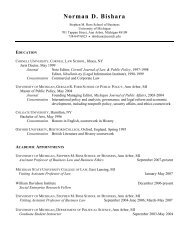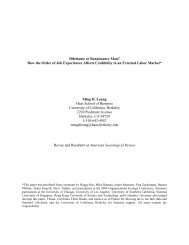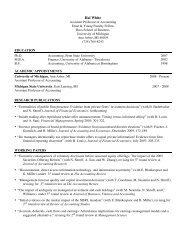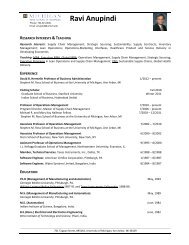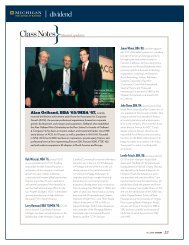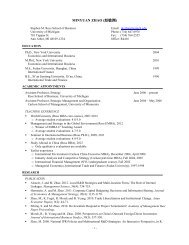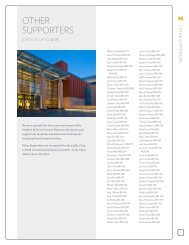DIvIDEnD - Stephen M. Ross School of Business - University of ...
DIvIDEnD - Stephen M. Ross School of Business - University of ...
DIvIDEnD - Stephen M. Ross School of Business - University of ...
Create successful ePaper yourself
Turn your PDF publications into a flip-book with our unique Google optimized e-Paper software.
photo by vineet modhgil<br />
a:<br />
“<br />
tarting a business<br />
S<br />
is like standing next to<br />
a swimming pool,” says Praveen Suthrum,<br />
MBA ’04. “As you’re writing your business<br />
plan, you’re saying, ‘This is how I’m going<br />
to swim — I’ll put my left hand in first, then<br />
my right.’ But once you jump in, it’s a very different<br />
experience.”<br />
suthrum’s experience started during his mBa spring break and<br />
evolved into nextservices inc., a revenue cycle management company.<br />
he co-founded the venture with partners Satish Malnaik,<br />
MBA ’04, and Ragavendra Baliga, MBA ’04, after consulting<br />
for his uncle’s medical practice, identifying problems and recommending<br />
ways to improve the doctor’s bottom line. “it made me<br />
start wondering if there was a bigger opportunity in the area,”<br />
suthrum says.<br />
there was. nextservices now counts more than 60 clients, ranging<br />
from solo medical practitioners to large physician groups. the<br />
company has collected more than $120 million on their behalf, and<br />
suthrum hopes to hit $1 billion next year.<br />
But initial setbacks threatened to sink the original plan suthrum<br />
and his partners floated in 2004. funding dried up. clients shut<br />
down. through sheer determination the team adapted and<br />
advanced, allowing nextservices to not only stay afloat but thrive.<br />
today the firm has 110 employees in ann arbor and mumbai.<br />
THE PREScRiPTion nextservices’ mission is ambitious: “enabling<br />
seamless healthcare delivery one patient at a time.” the company<br />
focuses on certain specialties and relies on the medical knowledge<br />
<strong>of</strong> its staff. “if you talk to our associates about stomach disease, they<br />
can discuss it like the back <strong>of</strong> their hand,” suthrum says. “knowing<br />
the language helps when we talk to insurance companies. we can<br />
ensure our clients get paid correctly.”<br />
sophisticated analytics <strong>of</strong>fer another strategic edge. “when<br />
clients ask, ‘how many patients are due for a colon screening’ or<br />
‘what types <strong>of</strong> denials are we most commonly getting,’ we can tell<br />
them,” says suthrum. “getting feedback helps avoid costly mistakes.”<br />
clients can access such analysis any time through customdeveloped,<br />
web-based s<strong>of</strong>tware.<br />
the firm <strong>of</strong>fers clients a multipronged approach. the consulting<br />
branch — nextclarity — first examines the inner workings<br />
<strong>of</strong> the practice. “then we can better adapt our solution to meet<br />
the client’s exact needs,” says suthrum. next the billing arm,<br />
nextclaims, takes over — doing the legwork to ensure physicians<br />
receive correct and timely payment.<br />
suthrum says such services are vital to a client’s short-term<br />
bottom line and long-term survival. with medicare cutting about<br />
21 percent <strong>of</strong> reimbursements, it is likely others will follow. many<br />
physicians haven’t pondered what these cuts mean. “they must<br />
increase the efficiency <strong>of</strong> their practice to avoid losing more money,”<br />
suthrum says. again, nextservices’ expertise is advantageous. if an<br />
insurance company decides cardiologists don’t need as many stents<br />
during a procedure — and only will reimburse for what it feels is<br />
appropriate — staff can knowledgably argue the doctors’ point.<br />
forthcoming healthcare legislation may complicate the business<br />
landscape, suthrum notes. more citizens will have access to<br />
coverage, but he anticipates the new system might function more<br />
like medicaid than medicare. “medicare is a better payer. it’s better<br />
organized and more efficient,” he says. “so if washington creates<br />
another medicaid, it means more work and less money for doctors,<br />
which again means physicians would find it difficult to focus on<br />
patient care.” But suthrum is both pragmatic and confident about<br />
new products and services he hopes to provide. “we see a huge<br />
opportunity and are well-positioned to address it,” he says.<br />
SPRinGBoARD it’s been a long road from spring break to successful<br />
startup. and it all began with a well-timed encounter when<br />
suthrum returned to <strong>Ross</strong> with his burgeoning expertise in healthcare.<br />
evening mBas malnaik and Baliga had been exploring new<br />
ventures that fused the indian and u.s. markets. as soon as they<br />
met suthrum, they had their angle. “we examined the insurance<br />
industry and saw all this technology to make more money from<br />
doctors. we wondered what would happen if we gave those weapons<br />
to doctors. nextservices is what happened,” suthrum says.<br />
the trio set an oct. 1, 2004, launch date — clients or no clients,<br />
funding or no funding. a Zell lurie institute Dare to Dream grant<br />
landed one <strong>of</strong> their first investments, and a u-m colleague became<br />
their first employee. suthrum spent september going door-todoor<br />
at practices throughout michigan, while malnaik created the<br />
company’s website and Baliga sought investors.<br />
for their first client, nextservices cut a deal to provide three<br />
months <strong>of</strong> free consulting in exchange for an enthusiastic testimonial.<br />
it worked until the client abruptly closed shop at the threemonth<br />
mark. funding was equally austere. an investor’s initial<br />
$50,000 ballooned to $200,000 within weeks, but then dried up<br />
completely when he opted to back a vineyard instead.<br />
the trio stayed the course and adapted accordingly. eventually<br />
the clients and the funding did come. today suthrum is swimming<br />
comfortably in that proverbial start-up pool. “what we’re doing<br />
now is completely different from what we put on that first business<br />
plan,” he says. “when i talk to someone about starting a business,<br />
i tell them they’re not really going to know. they just need to jump<br />
in and figure it out.” —Amy Spooner<br />
spring 2010 <strong>DIvIDEnD</strong> 37



